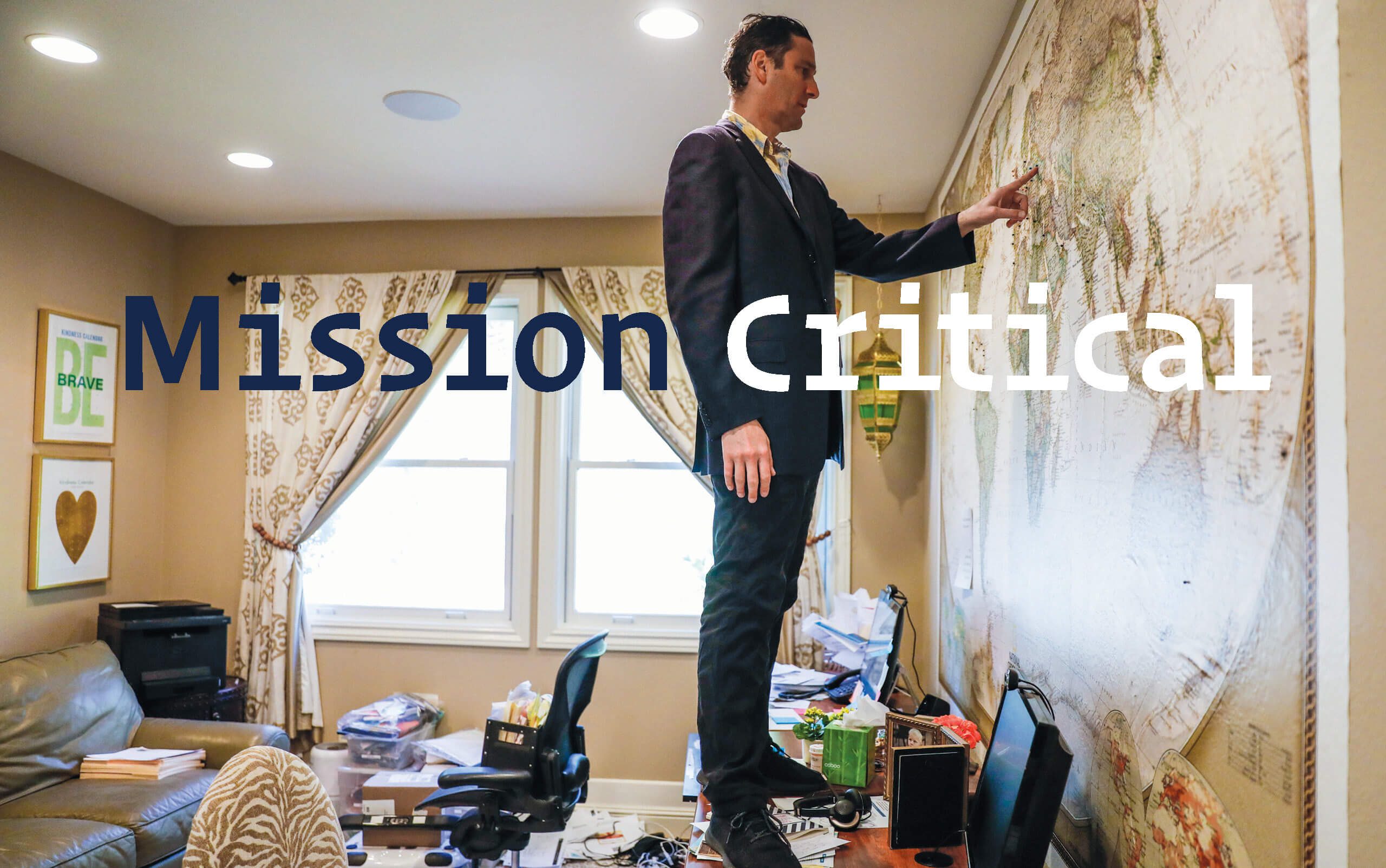Andy Kurtzig, BS 94, leads his Ukrainian employees amid an unrelenting war.
Standing in a long line to cross back into Slovakia from Western Ukraine last April, Andy Kurtzig, BS 94, felt his heart racing. Air raid sirens were blaring a bleak message through the night: “Take cover now, missiles on their way toward you!”
Although the heaviest fighting in Russia’s invasion of Ukraine was concentrated a thousand miles away in the eastern part of the country, Russian long-range missiles had also targeted the western city of Lviv, 170 miles north of where Kurtzig waited at the border. With no place to take cover, he knew he was within range. And the Russians had reason to feel vengeful: A day prior, Ukraine had sunk the Moskva, a guided-missile cruiser considered the flagship of Russia’s Black Sea fleet.
It was exactly the type of situation Kurtzig’s parents and brother feared when they first heard that the JustAnswer.com CEO, together with his wife, Sara, and their children, planned to spend spring break visiting refugee camps just outside the Ukrainian border. Kurtzig would also cross into Ukraine to distribute relief supplies. “Our family and friends thought we were crazy, especially going so soon after the war with Russia started,” says Kurtzig. Ultimately, one of his three children opted to stay in the Bay Area over safety concerns.
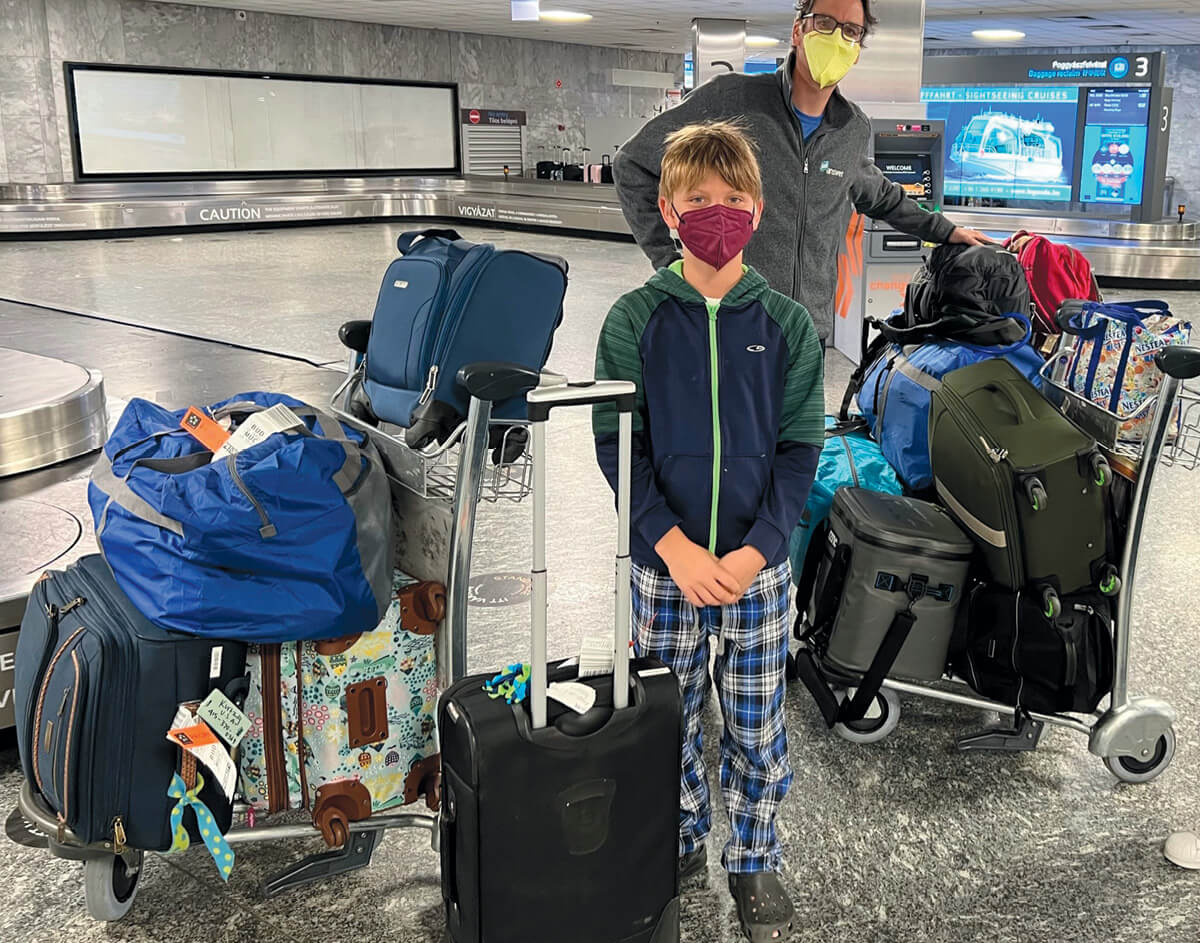
Russia’s invasion and its atrocities against Ukraine’s civilian population were not abstract to the Kurtzig family. Kurtzig founded JustAnswer in 2003 as an online question-and-answer forum to give users 24/7 access to professionals such as lawyers, doctors, veterinarians, and mechanics. By 2022, nearly 300 of the company’s 1,100 employees were based in the Ukrainian cities of Lviv and Uzhhorod, working in roles including user design, coding, and quality assurance. In 2019, he and Sara had pulled daughters Jamie, now 18, and Kelly, 14, and son, Kai, 12, out of school for a year to live abroad, spending their first six months in Lviv.
“These are our friends,” Kurtzig says. “It wasn’t ever a question of, ‘Should we be doing this or not?’ It was, ‘How are we going to make this work?’”
That night at the border, Kurtzig calmed his fear by leaning on logic. “Why would they hit something this close to the Slovakian border?” he thought—an act that might invite a military response from the NATO country and its allies. Thankfully, Kurtzig was right: The closest missile strike was 50 miles away, and he finally cleared the border inspection and safely rejoined his family near Michalovce.
Leading an organization through the rip currents of war is not part of your education unless you’ve had military training. But Kurtzig says the experience feels a lot like running a startup—and that his business background has been a useful asset. “You must be quick to understand what’s going on and how needs are changing,” he says. “You must listen constantly then react quickly and appropriately.
His successful leadership of JustAnswer during the war is a testament to the value of empathy and preparation in weathering even the most unrelenting and unpredictable of challenges. And his story is one any leader can learn from.
Kurtzig’s message to business leaders is that supporting—or even establishing—a Ukrainian workforce is more critical than ever. JustAnswer now has 302 employees in Ukraine, up from 252 when the war started, and they continue to hire.
Packing for war
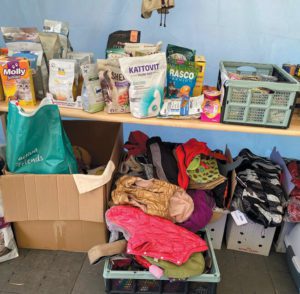 The Kurtzig family already had a track record of successful fundraising and organizing in support of a cure for Type 1 diabetes, which daughter Jamie has. Putting those skills to work, they quickly established a fundraising effort for Ukrainian relief via their Arizae Foundation, raising almost $600,000 to date. The 501(c)(3) has funded the creation of shelters, delivered medical supplies, and equipped Lviv city officials with security cameras and Starlink devices, which provide high-speed Internet coverage where traditional connections are unstable or unavailable. Together with a group of local tech companies and universities in Ukraine and the Ukrainian military, Kurtzig is also lending support to develop an air defense system, called “Sky Project,” that’s equivalent to Israel’s “Iron Dome” to repel Russian airstrikes.
The Kurtzig family already had a track record of successful fundraising and organizing in support of a cure for Type 1 diabetes, which daughter Jamie has. Putting those skills to work, they quickly established a fundraising effort for Ukrainian relief via their Arizae Foundation, raising almost $600,000 to date. The 501(c)(3) has funded the creation of shelters, delivered medical supplies, and equipped Lviv city officials with security cameras and Starlink devices, which provide high-speed Internet coverage where traditional connections are unstable or unavailable. Together with a group of local tech companies and universities in Ukraine and the Ukrainian military, Kurtzig is also lending support to develop an air defense system, called “Sky Project,” that’s equivalent to Israel’s “Iron Dome” to repel Russian airstrikes.
But the family wanted to do even more. To prepare for their trip to Western Ukraine, Kurtzig began sourcing his employees’ wish list of items, to be stashed in eight checked bags for their April journey. “We packed body armor, drones, night-vision goggles, and rangefinders,” says Kurtzig.
Where does a California tech CEO shop for war supplies, you might ask? Amazon.
After journeying to Budapest, Kurtzig and his family met with JustAnswer employee Yevhen Shyptur, who had managed to relocate there before the Ukrainian government barred men aged 18 to 60 from leaving the country. A Type 1 diabetic, his status as a war refugee in Hungary meant unpredictable access to life-saving insulin. Using donated supplies, Kurtzig upgraded him to an automated insulin delivery system called an artificial pancreas—the same wireless, advanced device Jamie uses for management of blood glucose levels.
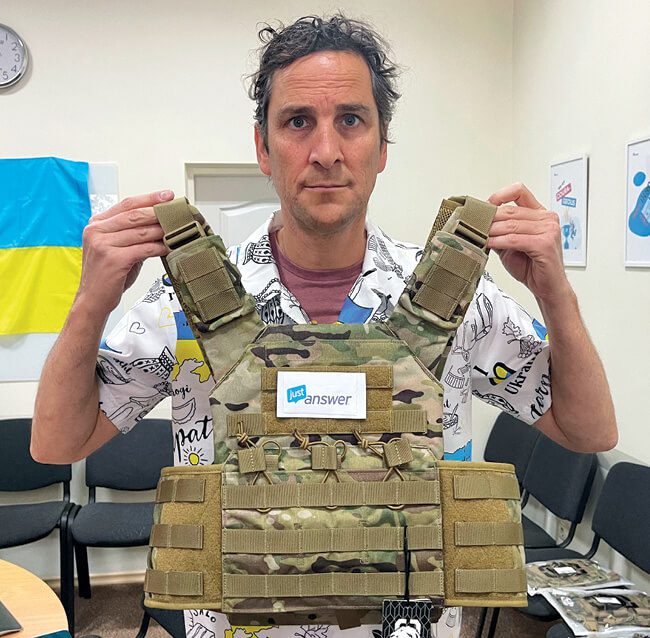 From Budapest, the Kurtzigs traveled by rental car into Slovakia, destined for the refugee camp at Michalovce, near the border with Ukraine. Expecting camps overflowing with refugees, the Kurtzigs learned that these border sites are mainly processing centers, where refugees spend only a few days before heading to relatives or points west. Since most Ukrainian men can’t or won’t leave their home country, the camp population was almost entirely women and children. Seeing those exhausted mothers and children walking across the border with their suitcases, having already traveled over a thousand miles via various modes of transportation, brought home the war’s grim reality for Kurtzig. “And their travels weren’t done yet,” he says.
From Budapest, the Kurtzigs traveled by rental car into Slovakia, destined for the refugee camp at Michalovce, near the border with Ukraine. Expecting camps overflowing with refugees, the Kurtzigs learned that these border sites are mainly processing centers, where refugees spend only a few days before heading to relatives or points west. Since most Ukrainian men can’t or won’t leave their home country, the camp population was almost entirely women and children. Seeing those exhausted mothers and children walking across the border with their suitcases, having already traveled over a thousand miles via various modes of transportation, brought home the war’s grim reality for Kurtzig. “And their travels weren’t done yet,” he says.
In addition to the medical and safety supplies distributed by the family in Michalovce were nearly a thousand notes of encouragement, written by American schoolchildren for their Ukrainian counterparts. “Thanks to Google Translate, a lot of them were written in Ukrainian,” says Kurtzig. “It was really heartwarming to share these positive messages of hope.”
Following a blueprint
In any crisis, advance planning makes a difference. In the case of JustAnswer, preparations for 2022 began back in 2014, during Ukraine’s Maidan Revolution. That year, then-President Viktor Yanukovych declined to sign an agreement to ally the country more closely with the European Union, kicking off mass public protests that the pro-Russian leader met with harsh crackdowns against his own citizens. Russia sent military support into the southeastern part of Ukraine to back Yanukovych’s efforts, culminating in the annexation of the Crimean Peninsula.
It was a wakeup call for Kurtzig, “We knew back in 2014 that if Russia overtook Ukraine, we needed a backup plan,” he says. Together with another business, JustAnswer rented office space in Poland to use in case of an emergency. Even more crucial was creating a crisis preparation plan laying out the detailed steps JustAnswer would follow depending on the conflict level in the country. “The document takes us from DEFCON 1 through DEFCON 5,” says Kurtzig.
Early steps ranged from backing up documentation to buying satellite phones and diesel generators and figuring out how to move employees to safety. If conflict increased to the next DEFCON level, JustAnswer leadership wanted a clear set of immediate actions to ensure employee safety and business continuation.
Kurtzig says that the listening skills honed at Haas were critical to developing this blueprint for handling crises. “For example, one of our big ideas for DEFCON 5 was to pay everybody a two-month salary advance. That was how we expected to help them—who doesn’t want a salary advance, right?” says Kurtzig. “But then we asked employees for their views, and they said, ‘No, we don’t want you to send funds to our Ukrainian bank account, which Russia is hacking into constantly. And Ukrainian hryvnias are getting devalued every day.’”
What employees wanted was for JustAnswer to pay them only 20% of their salaries, just enough to live on, and to keep the rest in U.S. dollars in a U.S. bank account, until they needed it. “It was the opposite of what we thought,” Kurtzig says. “It reminded me to listen and learn—whether from your employees or your customers.”
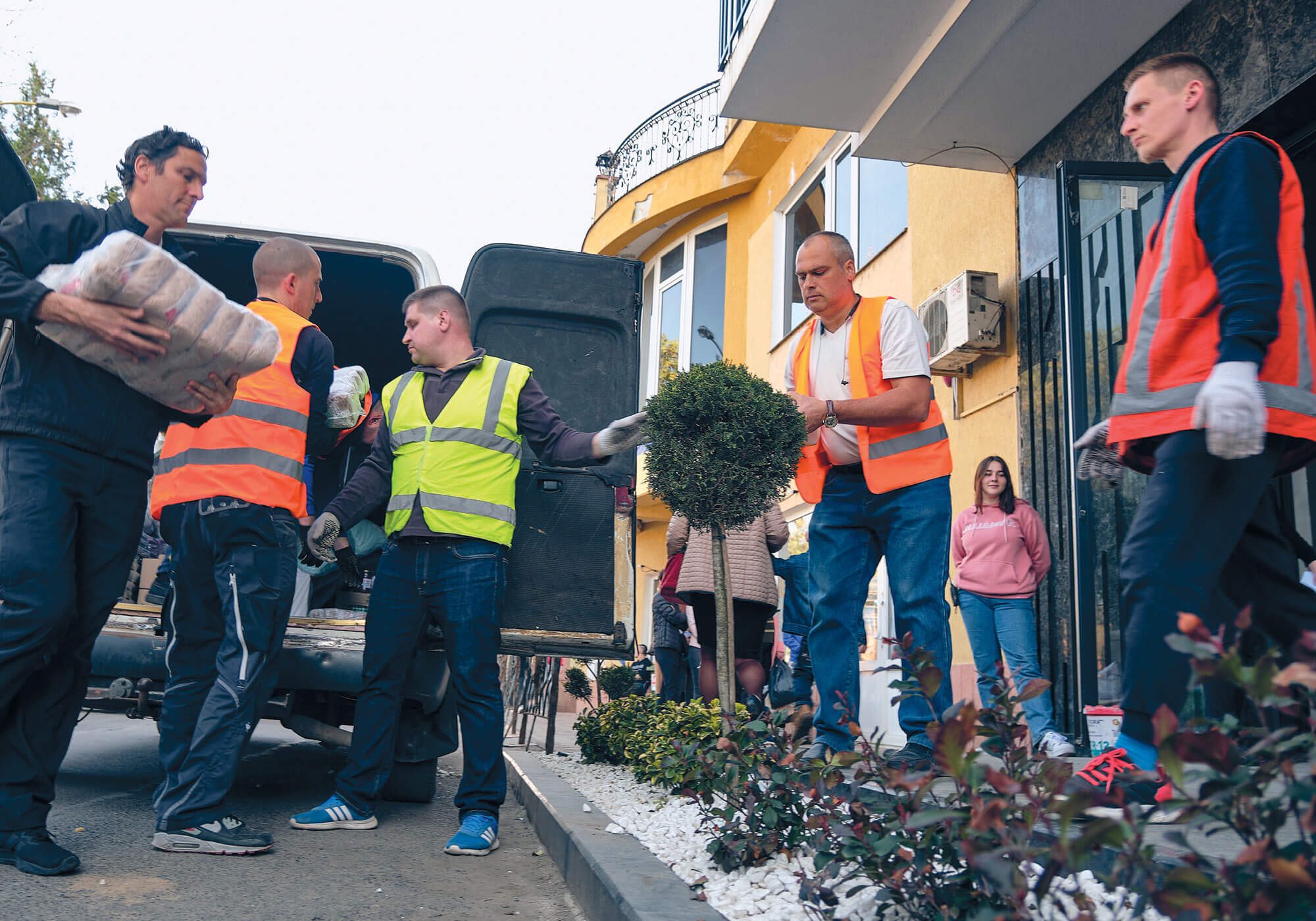
Journeying into Ukraine
Soon after Kurtzig and his family reached the Slovakian refugee camp, the time came to make the safety assessment about Kurtzig traveling on alone into Ukraine. Concerns about a retaliatory response to the Moskva sinking notwithstanding, JustAnswer colleagues confirmed that bombing raids in Western Ukraine had diminished in recent days and that the air raid alerts were less frequent, so Kurtzig opted to continue. He set off at 5 a.m. with supplies, accompanied by JustAnswer’s Senior Director of International Operations Nadiya Semen who, as a woman, could still move freely in and out of Ukraine.
Kurtzig also carried with him a letter secured with the help of employees who’d volunteered or been drafted into the Ukrainian army to alleviate any skepticism about his intent. The impressive document, sent by the Commander of the 24th Mechanized Brigade and printed on cardstock overlaid with images of rolling tanks, attested to Kurtzig’s good intentions.
“The border agents needed to make sure I wasn’t a Russian spy bringing these things in for nefarious purposes,” says Kurtzig. “My U.S. passport would look suspicious, since they don’t see many Americans going into Ukraine.” After three hours, he was cleared to enter the country.
Kurtzig and Semen then headed to the JustAnswer office in Uzhhorod, 25 miles away, closely monitoring the news for missile strikes. While the countryside looked mostly the same, Kurtzig was struck by the crowds of refugees that had swelled the city of 115,000 by an estimated third.
When they arrived at the office, they were greeted by 50 employees. “It was overwhelming,” says Kurtzig, recounting the many times the pandemic had unraveled his plans to return. “There were tears, there was joy, and I was just delighted to see and hug everyone for the first time since 2019.” Meanwhile, the JustAnswer team sorted the supplies for distribution to a diabetes center, to medical clinics, and to their military connections.
That afternoon, Kurtzig convened a virtual Q&A session to connect and hear stories from all his Ukrainian employees. One, a former paramedic who had volunteered on the front lines in the east, talked about needing tourniquets. “She didn’t have enough to treat all the limbs lost by Ukrainian fighters,” Kurtzig says. The atrocities have been well documented in Western media, but listening to his employees describe firsthand the violence by Russian aggressors brought more tears. “Imagine living that way. It’s just stress, every day,” he says. “Your life might be over 30 seconds from now.”
The last stop of Kurtzig’s visit was a refugee camp in the city center of Uzhhorod, to distribute a truckload of groceries and other supplies purchased locally. Unlike the border camp, the urban refugee center was overflowing. “It’s largely men and the women and children who didn’t want to leave their husbands or fathers behind,” Kurtzig says. “They’re stuck in Western Ukrainian cities and have been for months.”

Since the trip, the Arizae Foundation has pivoted to finance more supplies for food kitchens and refugee centers within Ukraine, as well as funded the creation of a just-opened national mental health center that provides free therapy and counseling treatment for Ukrainian citizens and soldiers suffering from PTSD and other stress- and trauma-related conditions.
Kurtzig returned to the city of Lviv this fall to help unveil the center with the mayor and other key officials. During this trip, he also brought 11 drones JustAnswer is donating to the war effort, commemorating the number of years the company has had a presence in the country. In addition, JustAnswer and Arizae are making a sizable donation to a program that’s establishing a training school for drone pilots, a measure designed to reduce error and loss of these expensive and vital devices by Ukraine troops.
“The border agents needed to make sure I wasn’t a Russian spy bringing these things in for nefarious purposes. My U.S. passport would look suspicious, since they don’t see many Americans going into Ukraine.”
Providing support
Back in 2020, an estimated one in five Fortune 500 companies had remote development teams working out of Ukraine, taking advantage of the country’s highly skilled workforce. Kurtzig’s message to business leaders is that supporting—or even establishing—a Ukrainian workforce is more critical than ever. JustAnswer now has 302 employees in Ukraine, up from 252 when the war started, and they continue to hire.
“Economies win wars,” Kurtzig says. “Israel is a good example; they’ve built up their economy, and it has funded their ability to defend themselves from surrounding countries.”
Russia can outspend Ukraine militarily, but with a strong domestic economy propelling them, Ukraine’s odds of defeating the invasion increase. JustAnswer employees are doing their part to shore up the Ukrainian economy by prepaying and double-paying taxes and overpaying utility bills to help keep those services afloat.
As for Kurtzig, his pledge to his employees is simple: “We’re committed to Ukraine and to our people,” he says. “We’re not going to exit Ukraine. Full stop.” Having witnessed the resilience of his team and of the Ukrainian people, Kurtzig adds, “It’s not a question of whether they will win the war with Russia, but when. They will fight to the death for Ukraine’s independence.”
